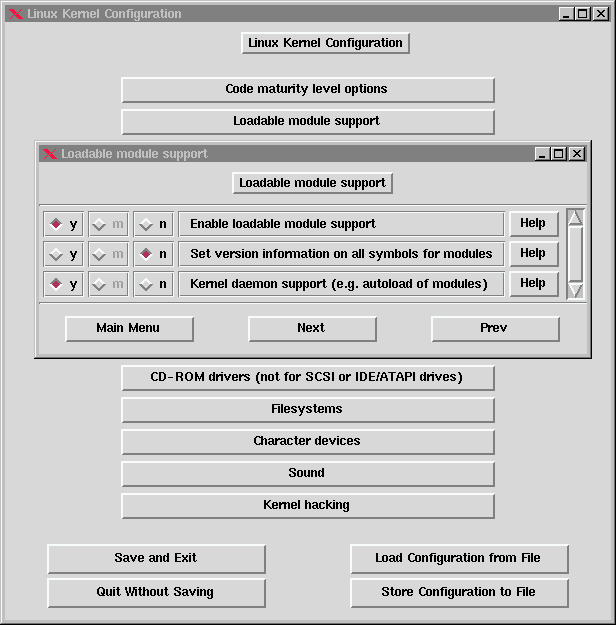

Enable loadable module support
Kernel modules are small pieces of compiled code which can be
inserted in or removed from the running kernel, using the
programs insmod and rmmod. This is described in the file
Documentation/modules.txt. Modules can be device drivers, file
systems, binary executable formats, and so on. If you think that
you may want to make use of modules with this kernel in the future,
then say Y here. If unsure, say Y.
Set version information on all symbols for modules
Usually, modules have to be recompiled whenever you switch to a new
kernel. Enabling this option makes it possible, and safe, to use the
same modules even after compiling a new kernel; this requires the
program modprobe. All the software needed for module support is in
the modules package in sunsite.unc.edu:/pub/Linux/kernel, available
via ftp (user: anonymous) to be extracted with "tar xzvf filename".
NOTE: if you say Y here but don't have the program genksyms (which
is also contained in the above mentioned modules package), then the
building of your kernel will fail.
If you are going to use modules that are generated from non-kernel
sources, you would benefit from this option. Otherwise it's not that
important. So, N ought to be a safe bet.
Kernel daemon support
Normally when you have selected some drivers and/or filesystems to
be created as loadable modules, you also have the responsibility to
load the corresponding module (via insmod/modprobe) before you can
use it. If you select Y here, the kernel will take care of this all
by itself, together with the user level daemon "kerneld". Note that
"kerneld" will also automatically unload all unused modules, so you
don't have to use "rmmod" either.
kerneld will also provide support for different user-level beeper
and screen blanker programs later on.
The "kerneld" daemon is included in the package "modules-1.2.8" and
later. You will probably want to read the kerneld mini-HOWTO,
available via ftp (user: anonymous) from
sunsite.unc.edu:/pub/Linux/docs/HOWTO/mini. If unsure, say Y.
Last Modified: 17 September 1996
St. Louis Unix Users Group - Linux SIG